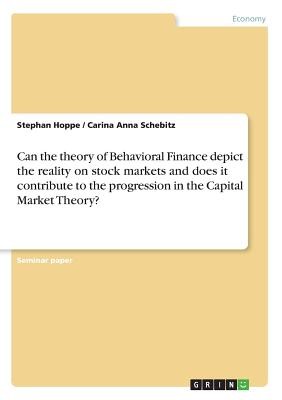
- We will send in 10–14 business days.
- Author: Stephan Hoppe
- Publisher: GRIN Verlag
- ISBN-10: 3668597340
- ISBN-13: 9783668597341
- Format: 14.8 x 21 x 0.2 cm, minkšti viršeliai
- Language: English
- SAVE -10% with code: EXTRA
Can the theory of Behavioral Finance depict the reality on stock markets and does it contribute to the progression in the Capital Market Theory? (e-book) (used book) | bookbook.eu
Reviews
Description
Seminar paper from the year 2015 in the subject Business economics - Investment and Finance, grade: 1,7, University of Applied Sciences Essen, language: English, abstract: "The Portfolio Theory" by Harry Markowitz, the "Capital Asset Pricing Model" by William Sharpe and the concept of the "Homo Oeconomicus" of Adam Smith - all of these models that are taught to business students and referred to by financial specialists all over the world are based on the assumption of the fundamental efficiency of markets. Market analysts build their substantial economic and financial predictions on the supposition that investors and corporations always behave and decide rationally. Consequently there would not be a chance that manias, panics or crashes ever occur. Nevertheless there were various speculation bubbles in the past such as the 1929 Stock-market-crash, the Dot-com bubble starting 1997 and the US-Subprime crisis as of 2007. So stock prices show fluctuations that cannot be only elucidated by economic factors. Moreover there are studies that come to the conclusion that there is only a low correlation between share prices and fundamental data. Concomitant new research approaches deployed that either developed the existing models further or even created a complete paradigmatic change. Nowadays when it comes to explaining the occurrences on the stock markets the field of psychology and the behavioral science gain in relevance. However the following question arises: Can the theory of Behavioral Finance depict the reality on stock markets and its participants and does it make a contribution for the progression in the Capital Market Theory? Yet there are some approaches that attempted to answer this question but there is no scientific consensus about it. Hence this term paper should accomplish a concise but fundamental contribution for the contemplation of this topic.
EXTRA 10 % discount with code: EXTRA
The promotion ends in 22d.00:05:56
The discount code is valid when purchasing from 10 €. Discounts do not stack.
- Author: Stephan Hoppe
- Publisher: GRIN Verlag
- ISBN-10: 3668597340
- ISBN-13: 9783668597341
- Format: 14.8 x 21 x 0.2 cm, minkšti viršeliai
- Language: English English
Seminar paper from the year 2015 in the subject Business economics - Investment and Finance, grade: 1,7, University of Applied Sciences Essen, language: English, abstract: "The Portfolio Theory" by Harry Markowitz, the "Capital Asset Pricing Model" by William Sharpe and the concept of the "Homo Oeconomicus" of Adam Smith - all of these models that are taught to business students and referred to by financial specialists all over the world are based on the assumption of the fundamental efficiency of markets. Market analysts build their substantial economic and financial predictions on the supposition that investors and corporations always behave and decide rationally. Consequently there would not be a chance that manias, panics or crashes ever occur. Nevertheless there were various speculation bubbles in the past such as the 1929 Stock-market-crash, the Dot-com bubble starting 1997 and the US-Subprime crisis as of 2007. So stock prices show fluctuations that cannot be only elucidated by economic factors. Moreover there are studies that come to the conclusion that there is only a low correlation between share prices and fundamental data. Concomitant new research approaches deployed that either developed the existing models further or even created a complete paradigmatic change. Nowadays when it comes to explaining the occurrences on the stock markets the field of psychology and the behavioral science gain in relevance. However the following question arises: Can the theory of Behavioral Finance depict the reality on stock markets and its participants and does it make a contribution for the progression in the Capital Market Theory? Yet there are some approaches that attempted to answer this question but there is no scientific consensus about it. Hence this term paper should accomplish a concise but fundamental contribution for the contemplation of this topic.


Reviews